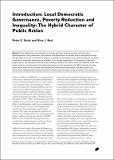| dc.contributor.author | Spink, Peter K. | en |
| dc.contributor.author | Best, Nina J. | en |
| dc.date.accessioned | 2016-01-27T13:42:07Z | |
| dc.date.available | 2016-01-27T13:42:07Z | |
| dc.date.issued | 01/11/2009 | en |
| dc.identifier.citation | Spink, P., K. and Best, N., J. (2009) Introduction: Local Democratic Governance, Poverty Reduction and Inequality: The Hybrid Character of Public Action. IDS Bulletin 40(6): 1-12 | en |
| dc.identifier.issn | 1759-5436 | en |
| dc.identifier.uri | https://opendocs.ids.ac.uk/opendocs/handle/20.500.12413/8076 | |
| dc.description.abstract | It has largely been assumed that as societies get better at being broader and more open (decentralisation, local government, participation and governance), so services tend to improve and things will get better for those in situations of poverty. In testing this assumption, the LogoLink network has drawn on studies of innovative experiences by members of its partner organisations. The emphasis of the joint project was on the local actors and the social processes involved. The results show how effective action and impact requires not only community?based organisations, social movements and NGO networks, but also public sector actors who can make links between the institutional environment, the public sector and communities. Recognising this hybrid character of public action has been a key conclusion from the studies. | en |
| dc.format.extent | 12 | en |
| dc.publisher | Blackwell Publishing Ltd | en |
| dc.relation.ispartofseries | IDS Bulletin Vol. 40 Nos. 6 | en |
| dc.rights.uri | http://www.ids.ac.uk/files/dmfile/IDSOpenDocsStandardTermsOfUse.pdf | en |
| dc.title | Introduction: Local Democratic Governance, Poverty Reduction and Inequality: The Hybrid Character of Public Action | en |
| dc.type | Article | en |
| dc.rights.holder | © 2009 The Authors. Journal compilation © Institute of Development Studies | en |
| dc.identifier.doi | 10.1111/j.1759-5436.2009.00079.x | en |

